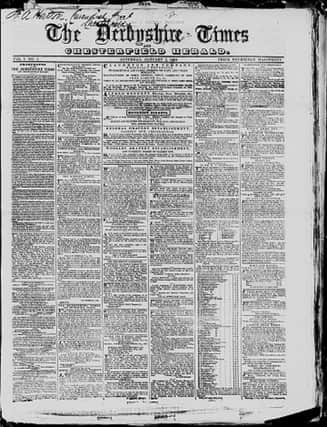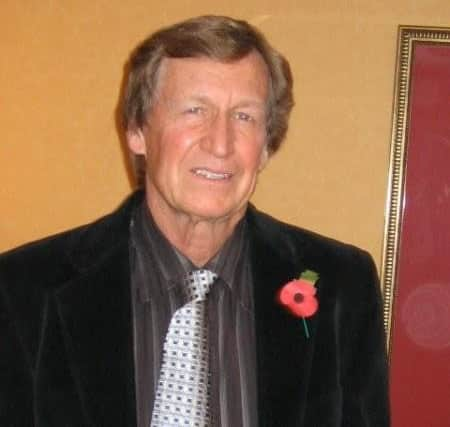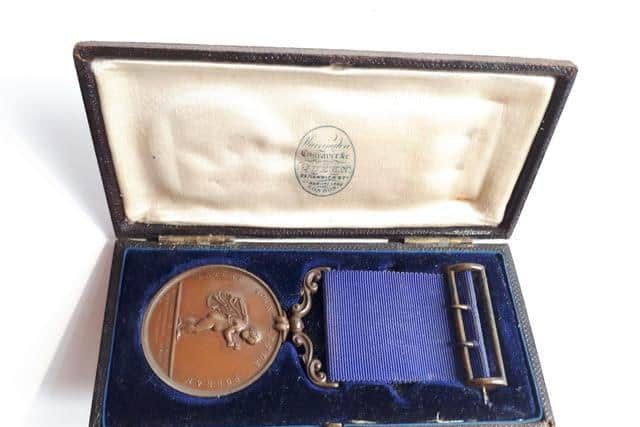Great-grandson of Derbyshire Times' early editor rolls back the years on his ancestors' lives
This article contains affiliate links. We may earn a small commission on items purchased through this article, but that does not affect our editorial judgement.


Bob Hopper’s great-granddad became editor and reporter on the Derbyshire Times as a teenager, following the death of his father who launched the business.
Francis Augustus Hatton, a printer, founded the Derbyshire Times in 1854 with the first edition hitting the streets on January 7. The four-page publication, printed at Cavendish Street and published every Saturday, was the first penny paper in the Peak District.
Advertisement
Hide AdAdvertisement
Hide AdFollowing Francis’ death in 1859, his wife Mary Ann took over as printer and publisher. Bob said: “She was joined at that time by their son William Hedges Hatton (my great-grandfather) in the role of reporter and editor along with their older son, Joseph Paul Christopher Hatton. At the time William would have been 18 and Joseph 22.”


The paper was later printed twice weekly and circulated in Derbyshire, South Yorkshire, Nottinghamshire and part of Cheshire.
By 1869 the Derbyshire Times was in the hands of new owners, Palmer and Edmunds. William Hatton and Wilfred Edmunds worked as reporters and assistant editors among the paper’s 24 employees.
The Edmunds family maintained their involvement until 1978 when the company was sold to Johnston Press.
Advertisement
Hide AdAdvertisement
Hide AdWilliam Hatton became editor of the Ashton & Stalybridge Reporter in 1873 and later held editorial positions with the Northern Whig in Belfast, the Bradford Daily Chronicle and the Midland Evening News in Wolverhampton.


While his family were living in Seacombe, Cheshire, William’s teenage daughter saved a little boy from drowning. The four-year-old was playing with his boat when he slipped into the water. Unable to swim and fully clothed, Mary, 15, jumped into the pond and pulled the boy to safety. She was awarded the Royal Humane Bronze Medal in 1884. Mary’s grandson Bob, who lives in Los Angeles, said: “She was one of the very rare women at that time to be so honoured for her bravery.”
William’s brother, Joseph, went on to be appointed editor of the Bristol Times & Mirror, a post he held for five years. He moved to England’s capital city in 1868 where he acted as special London correspondent for the New York Times, the Sydney Morning Herald and the Berlin ‘Kreuz-Zeiung'.
Joseph served as editor of the London Times from 1874 to 1881. He was in America in 1881 when President Garfield was shot and cabled a three-hour telegraphic message to his paper the Standard which beat its London contemporaries with the news by a day.
Advertisement
Hide AdAdvertisement
Hide AdIn 1892 Joseph became editor of the People newspaper, now known as the Sunday People.
Sadly, Joseph’s later life was marred by tragedy when his explorer son Frank died at the age of 22 while tracking a wounded elephant in the jungle in Borneo.
Joseph’s older daughter, Helen, married the Royal Academy painter William Margetson. His younger daughter Bessie Lyle Hatton, who was active in the Suffragette movement, founded the Women Writers Suffrage League.
Announcing Joseph’s death in 1907, the New York Times stated: “His father (Francis) was founder and editor of the Derbyshire Times. Joseph Hatton was known as a brilliant journalist, novelist and playwright".
Front page image: Copyright: The British Library Board. All rights reserved. With thanks to The British Newspaper Archive (www.britishnewspaperarchive.co.uk).